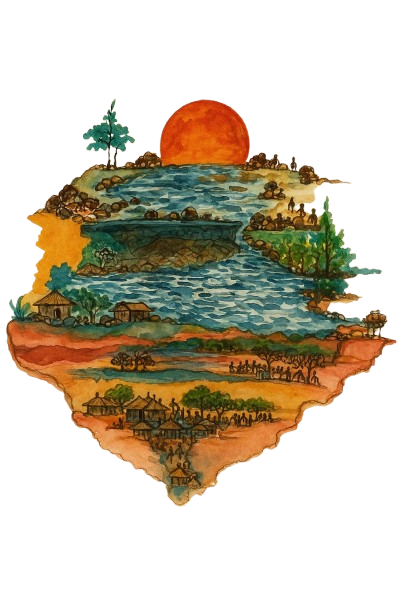Home > About Us
RRA Foundation
An institutional legacy of network
The challenges in rainfed regions are complex
and deeply interconnected — No single
organization, institution, or actor can address these
challenges in isolation.
The Revitalising Rainfed Agriculture (RRA) Foundation emerged from Revitalising Rainfed Agriculture (RRA) Network, has been working for the last fifteen years to strengthen rainfed farming and the communities that depend on it. In India, more than 50% of agriculture is rainfed, yet policies and programmes often do not address the real needs of dryland farmers. The RRA Network was formed in 2007 to bring together farmers, civil society groups, researchers, and policymakers to change this situation.
Many Hands, Many Strengths
Rainfed farming is complex, and no single institution can address all its challenges. The Network tested new ideas on seeds, crops, livestock, and markets through pilots and partnerships. These efforts influenced the 12th Five Year Plan, supported millet procurement by states, and set standards for traditional seed varieties.
One Voice, Greater Impact
When organisations or farmers speak alone, their impact is limited. By working together, the Network has been able to shape bigger agendas—like mainstreaming millets, securing recognition for pastoralists in the 2024 Livestock Census, and developing community managed alternative seed system. The Millets for Millions convention brought many stakeholders together and opened new opportunities to advance millet work across states.
Rooted in Local Contexts:
The Network’s work in states such as Maharashtra, Himachal Pradesh, Karnataka, and regions such as Bundelkhand, Manbhum, Tribal Tri-junction of Raj, MP and Guj shows how local organisations and communities can anchor development in their own contexts. Women and youth leaders have played an important role in making these efforts more relevant and sustainable.
Learning Together:
Thematic working groups on seeds, millets, livestock, cropping systems, and markets have become spaces for members to learn from each other and develop new ideas. Partnerships with other networks—like WGWLO, FOLU, RCRC, and MAKAAM—have also enriched our collective knowledge and reach. The NCNF (National Coalition of Natural farming) & IBBN (Indian Biochar and Bioresource Network)is one example of how shared learning has led to new initiatives.
Shared Responsibility, Lasting Strength:
A network spreads leadership and responsibility among many members, which makes it stronger and less dependent on one organisation. Over the time, the network has grown bigger with more than 200 members across 12 states in India. In 2023, the creation of the RRA Foundation gave the Network an institutional base for long-term sustainability.
Context and Need

About 51% of India’s net sown area is rainfed, accounting for nearly 40% of total food production and supporting two-thirds of the country’s livestock (NRAA,2022). Around 61% of India’s farmer population depends on these rainfed farms for their livelihoods. Yet, decades of over-exploitation, declining soil health, and limited irrigation have left these landscapes highly vulnerable, with climate change exacerbating the risks. Monsoon shifts, shorter rainy periods, and an 8–10% reduction in kharif rainfall over the past two decades (CRIDA, 2020) have further undermined agricultural stability. Despite these challenges, millions continue to work these farms, sustaining local food systems and preserving diverse, traditional production practices that hold promise for resilient, sustainable agriculture.
These conditions drive significant seasonal migration, particularly from tribal and drought-prone states such as Jharkhand, Odisha, Madhya Pradesh, Chhattisgarh, Rajasthan, Gujarat, Telangana, and Maharashtra. Census 2011 and subsequent studies show that 29–35% of rural households migrate for work, with women comprising 55–70% of the remaining agricultural workforce. This feminisation of farming increases time poverty, nutritional stress, and workload pressures on women. Stunting levels remain critically high in these regions, with rates exceeding 40% in Jharkhand and over 35% in Madhya Pradesh, Gujarat, Maharashtra, Rajasthan, Odisha, and Karnataka (NFHS-5, 2019–21).
Our Mandate
The RRA Foundation was established to address these intertwined challenges. We recognize that many innovative solutions already exist at the grassroots—led by farmer groups, community collectives, and civil society organisations—but they often lack the financial resources and professional support to scale. By mobilising domestic resources, creating a flexible pool of funds, and sub-granting to grassroots partners and networks, the Foundation fosters collaboration, strengthens local capacity, and invests in ecosystem-building.
Our Board
GAGAN SETHI
Promoting Director
Gagan Sethi is a development educator, organizational development expert, and gender trainer with over four decades of experience in the sector. As the founder of Janvikas, he has played a key role in establishing several strategic organizations across India, including Kutch Mahila Vikas Sangathan, Sahjeevan, Drishti, Centre for Social Justice, and the HID Forum. His expertise lies in human and institutional development, capacity building, and training. He was a former chairperson of RRA Network Advisory committee and currently serves as a member of the advisory board.
KUSHAGRA MERCHANT
Promoting Director
Kushagra Merchant is a management consultant. He is a co-founder of Social Synergy Foundation (sosynergy.org) that, since its set-up in 2014, provides long-term organisational development and institution building support to a variety of predominantly small and medium-sized civil society organisations. Prior to Social Synergy Foundation, he was a management consultant, first with Accenture Services India’s consulting division, and later with the erstwhile Monitor Group’s unit called Monitor Inclusive Markets (later part of FSG) on their work on development of market-based models for low-income housing and drinking water in urban India.
Compliance
RRA Foundation is committed to providing clear, transparent and timely information on our finances and grantmaking efforts. We post our annual reports and audited financial statements to the site as they become available
Finances and Reports
Revitalisation Rainfed Agriculture Foundation – Empowering rainfed regions through patient capital and strengthened grassroots networks. A Section 8 company committed to sustainable rural transformation since 2023.
Subscribe Now
Don’t miss our future updates! Get Subscribed Today!
©2025. RRA Foundation. All Rights Reserved.

